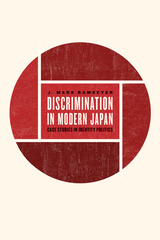
In this book, J. Mark Ramseyer, a noted authority on Japan looks at discrimination against groups in Japanese society, focusing on the Korean, Okinawan, and Burakumin groups. Ramseyer asks why they experience discrimination in Japan, an unusually homogeneous society. Is it because of some prejudice on the part of the majority that prevents their integration into mainstream Japanese society? Or is it because some of the dynamics within the group create incentives for the group to stay together and to be on the fringes of society?
Ramseyer argues that the real explanation is the latter, and each of these three groups has been victimized by its own leadership. Precisely because the groups are dysfunctional, members of the group cannot control members who would appoint themselves group leaders. The result has been the capture of leadership positions by people who manipulate the group to their own private advantage and to the detriment of the group as a whole.

Two of the largest minority groups in modern Japan—Koreans, who emigrated to the metropole as colonial subjects, and a social minority known as the Burakumin, who descended from former outcastes—share a history of discrimination and marginalization that spans the decades of the nation’s modern transformation, from the relatively liberal decade of the 1920s, through the militarism and nationalism of the 1930s, to the empire’s demise in 1945.
Through an analysis of the stereotypes of Koreans and Burakumin that were constructed in tandem with Japan’s modernization and imperial expansion, Jeffrey Bayliss explores the historical processes that cast both groups as the antithesis of the emerging image of the proper Japanese citizen/subject. This study provides new insights into the majority prejudices, social and political movements, and state policies that influenced not only their perceived positions as “others” on the margins of the Japanese empire, but also the minorities’ views of themselves, their place in the nation, and the often strained relations between the two groups.

The Burakumin. Stigmatized throughout Japanese history as an outcaste group, their identity is still “risky,” their social presence mostly silent, and their experience marginalized in public discourse. They are contemporary Japan’s largest minority group—between 1.5 and 3 million people. How do young people today learn about being burakumin? How do they struggle with silence and search for an authentic voice for their complex experience?
Voice, Silence, and Self examines how the mechanisms of silence surrounding burakumin issues are reproduced and challenged in Japanese society. It explores the ways in which schools and social relationships shape people’s identity as burakumin within a “protective cocoon” where risk is minimized. Based on extensive ethnographic research and interviews, this longitudinal work explores the experience of burakumin youth from two different communities and with different social movement organizations.
Christopher Bondy explores how individuals navigate their social world, demonstrating the ways in which people make conscious decisions about the disclosure of a stigmatized identity. This compelling study is relevant to scholars and students of Japan studies and beyond. It provides crucial examples for all those interested in issues of identity, social movements, stigma, and education in a comparative setting.

READERS
Browse our collection.
PUBLISHERS
See BiblioVault's publisher services.
STUDENT SERVICES
Files for college accessibility offices.
UChicago Accessibility Resources
home | accessibility | search | about | contact us
BiblioVault ® 2001 - 2024
The University of Chicago Press









